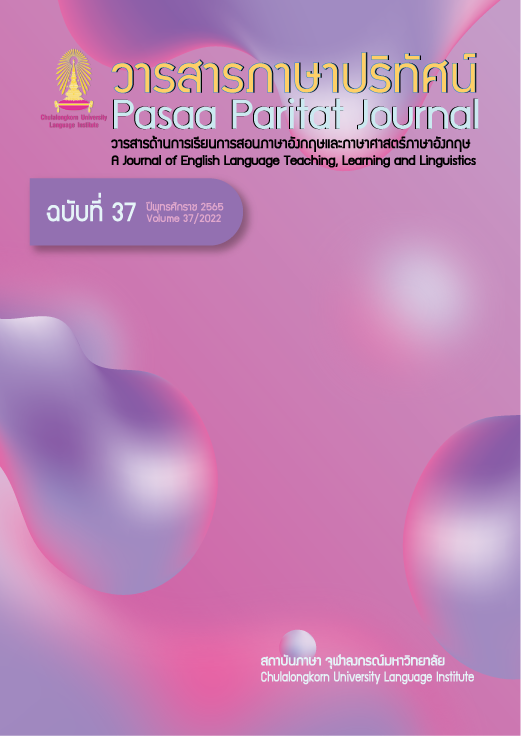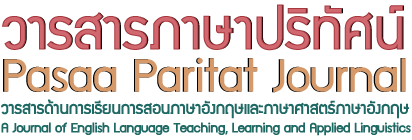Foreign language speaking anxiety of Thai EFL students in virtual Classrooms-Pathumwan Institute for Technology students
DOI:
https://doi.org/10.58837/CHULA.PPJ.37.3คำสำคัญ:
virtual classrooms, foreign language speaking anxiety, Thai EFL, cultural obstacleบทคัดย่อ
Virtual classrooms for English language instruction became a necessity globally during the worst of the COVID-19 pandemic. Nevertheless, online study cannot be blamed for speaking anxiety of EFL students; foreign language speaking anxiety has long been a detrimental issue that has obstructed Thai EFL learners from speaking English. This study aims to investigate the major concerns that cause undergraduate students at Pathumwan Institute of Technology to experience foreign language speaking anxiety in virtual English classrooms; identify a relationship between Thai cultural obstacles and foreign language speaking anxiety (FLSA) that hinders them from speaking English in a virtual environment, and identify pedagogical implications in an effort to ameliorate FLSA of Thai EFL students in virtual classrooms. Opened-ended questions and semi-structured interviews were employed for data collection. The results of the open-ended questions uncovered six concerns among Pathumwan students that led to speaking anxiety: limited vocabulary, fear of wrong pronunciation, inability to process thoughts into words, unpleasant psycho-physiological symptoms, fear of negative evaluation, and fear of miscommunication. The interview results revealed that loss of face, a key Thai cultural issue, was linked to the fear of negative evaluation of Thai EFL students while speaking in public. Thence, it is recommended that mistakes be addressed as acceptable in language learning, and that individual-specific measures be taken according to each learner’s English language proficiency level.
เอกสารอ้างอิง
Akkakoson, S. (2016). Speaking anxiety in English conversation classrooms among Thai students. Malaysian Journal of Learning and Instruction, 13(1), 63–82.
Akramy, S. (2022). Speaking Anxiety in an Afghan EFL Setting: A Case Study of an Afghan University. Language In India, 20(21), 161-182.
Alamri, W. A. (2019). Effectiveness of qualitative research methods: Interviews and diaries. International Journal of English and Cultural Studies, 2(1), 65–70. https://doi.org/10.11114/ijecs.v2i1.4302
Al-Qahtani, M. H. (2019). Teachers' and students' perceptions of virtual classes and the effectiveness of virtual classes in enhancing communication skills. Arab World English Journal, (1), 223–240. https://doi.org/10.24093/awej/efl1.16
Ansari, M. (2015). Speaking Anxiety in ESL/EFL Classrooms: A Holistic Approach and Practical Study. International Journal of Educational Investigations, 2(4), 38-46.
Asmar, M. J. (2009). Anxiety of Public Speaking In English Language Among Uum Arab-Students (dissertation).
Basilio, M. J., & Wongrak, C. (2017). The Asian Conference on Education & International Development 2017 Official Conference Proceedings. In Foreign-Language Anxiety: A case of Thai EFL Learners at Ubon Ratchathani University. Tokyo; The International Academic
Forum.
Bohlin, R. M., & Hunt, N. P. (1995). Course structure effects on students' computer anxiety, confidence and attitudes. Journal of Educational Computing Research, 13(3), 263–270. https://doi.org/10.2190/yb6q-hx39-11kk-gkyl
Chinpakdee, M. (2015). Thai EFL University Students’ Perspectives on Foreign anguage Anxiety. Silpakorn University Journal of Social Sciences, Humanities, and Arts, 15(3), 61–90. https://so02.tci-thaijo.org/index.php/hasss/article/view/44672/37025.
Denzin, N. K., & Lincoln, Y. S. (2005). Introduction: The Discipline and Practice of Qualitative Research. In N. K. Denzin & Y. S. Lincoln (Eds.), The Sage handbook of qualitative research,1–32, Sage Publications Ltd.
Dörnyei, Z. (2005). The psychology of the language learner: Individual differences in second language acquisition. Lawrence Erlbaum.
Dörnyei, Z. & Taguchi, T. (2010). Questionnaires in Second language research: Construction, administration, and processing. (2nd ed.). Routledge.
ไฟล์ประกอบ
เผยแพร่แล้ว
เวอร์ชัน
- 2023-06-08 (3)
- 2023-05-31 (2)
- 2022-11-22 (1)
รูปแบบการอ้างอิง
ฉบับ
ประเภทบทความ
สัญญาอนุญาต
ลิขสิทธิ์ (c) 2023 วารสารภาษาปริทัศน์

อนุญาตภายใต้เงื่อนไข Creative Commons Attribution-NonCommercial-NoDerivatives 4.0 International License.


